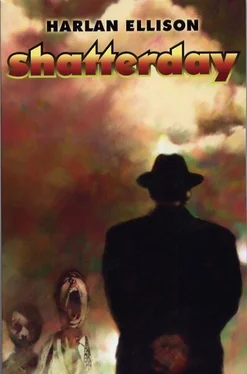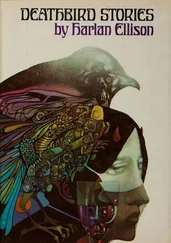And there he had pulled off the road, gotten out of the car, leaving the door open, and walked away down the October hills to sit, finally and at last, staring at the loch, green and blue and silent as the mirror of his memory.
Where only the buzzing fly reminded him of the past.
He had been thirty-five when he said, “Where does the time go?” And he was thirty-seven as he sat on the hill.
And it was there that the dream died.
He stared at the hills, at the valley that ran off to left and right, at the sparkling water of the loch, and knew he had wasted his time again. He had resolved to do something; but he had done nothing. Again.
There was no place for him here.
He was out of phase with all around him. He was an alien object. A beer can thrown into the grass. A broken wall untended and falling back into the earth from which it had been wrenched stone by stone.
He felt lonely, starved, incapable of clenching his hands or clearing his throat. A ruin from another world, set down in foreign soil, drinking air that was not his to drink. There were no tears, no pains in his body, no deep and trembling sighs. In a moment, with a fly buzzing, the dream died for him. He had not been saved; had, in fact, come in an instant to understand that he had been a child to think it could ever change. What do you want to be when you grow up? Nothing. As I have always been nothing.
The sky began to bleach out.
The achingly beautiful golds and oranges and yellows began to drift toward sepia. The blue of the loch slid softly toward chalkiness, like an ineptly prepared painting left too long in direct sunlight. The sounds of birds and forest creatures and insects faded, the gain turned down slowly. The sun gradually cooled for Ian Ross. The sky began to bleach out toward a gray-white newsprint colorlessness. The fly was gone. It was cold now; very cold now.
Shadows began to superimpose themselves over the dusty mezzotint of the bloodless day:
A city of towers and minarets, as seen through shallow, disturbed water; a mountain range of glaciers with snow untracked and endless as an ocean; an ocean, with massive, serpent-necked creatures gliding through the jade deeps; a parade of ragged children bearing crosses hewn from tree branches; a great walled fortress in the middle of a parched wasteland, the yellow earth split like strokes of lightning all around the structure; a motorway with hundreds of cars speeding past so quickly they seemed to be stroboscopic lines of colored light; a battlefield with men in flowing robes and riding great-chested stallions, the sunlight dancing off curved swords and helmets; a tornado careening through a small town of slatback stores and houses, lifting entire buildings from their foundations and flinging them into the sky; a river of lava bursting through a fissure in the ground and boiling toward a shadowy indication of an amusement park, with throngs of holiday tourists moving in clots from one attraction to another.
Ian Ross sat, frozen, on the hillside. The world was dying around him. No… it was vanishing, fading out, dematerializing. As if all the sand had run out of the hourglass around him: as if he were the only permanent, fixed and immutable object in a metamorphosing universe suddenly cut loose from its time-anchor.
The world faded out around Ian Ross, the shadows boiled and seethed and slithered past him, caught in a cyclonic wind tunnel and swept away past him, leaving him in darkness.
He sat now, still, quiet, too isolated to be frightened.
He thought perhaps clouds had covered the sun.
There was no sun.
He thought perhaps it had been an eclipse, that his deep concentration of his hopeless state had kept him from noticing.
There was no sun.
No sky. The ground beneath him was gone. He sat, merely sat, but on nothing, surrounded by nothing, seeing and feeling nothing save a vague chill. It was cold now, very cold now.
After a long time he decided to stand and did stand: there was nothing beneath or above him. He stood in darkness.
He could remember everything that had ever happened to him in his life. Every moment of it, with absolute clarity. It was something he had never experienced before. His memory had been no better or worse than anyone else’s, but he had forgotten all the details, many years in which nothing had happened, during which he had wasted time—almost as a mute witness at the dull rendition of his life.
But now, as he walked through the limbo that was all he had been left of the world, he recalled everything perfectly. The look of terror on his mother’s face when he had sliced through the tendons of his left hand with the lid from the tin can of pink lemonade: he had been four years old. The feel of his new Thom McAn shoes that had always been too tight, from the moment they had been bought, but which he had been forced to wear to school every day, even though they rubbed him raw at the back of his heels: he had been seven years old. The Four Freshmen standing and singing for the graduation dance. He had been alone. He had bought one ticket to support the school event. He had been sixteen. The taste of egg roll at Choy’s, the first time. He had been twenty-four. The woman he had met at the library, in the section where they kept the book on animals. She had used a white lace handkerchief to dry her temples. It had smelled of perfume. He had been thirty. He remembered all the sharp edges of every moment from his past. It was remarkable. In this nowhere.
And he walked through gray spaces, with the shadows of other times and other places swirling past. The sound of rushing wind, as thought the emptiness through which he moved was being constantly filled and emptied, endlessly, without measure or substance.
Had he known what emotions to call on for release, he would have done so. But he was numb in his skin. Not merely chilled, as this empty place was chilled, but somehow inured to feeling from the edge of his perceptions to the center of his soul. Sharp, clear, drawn back from the absolute past, he remembered a day when he had been eleven, when his mother had suggested that for his birthday they make a small party, to which he would invite a few friends. And so (he remembered with diamond-bright perfection) he had invited six boys and girls. They had never come. He sat alone in the house that Saturday, all his comic books laid out in case the cake and party favors and pin-the-tail-on-the-donkey did not hold their attention sufficiently. Never came. It grew dark. He sat alone, with his mother occasionally walking through the living room to make some consoling remark. But he was alone, and he knew there was only one reason for it: they had all forgotten. It was simply that he was a waste of time for those actually living their lives. Invisible, by token of being unimportant. A thing unnoticed: on a street, who notices the mailbox, the fire hydrant, the crosswalk lines? He was an invisible, useless thing.
He had never permitted another party to be thrown for him.
He remembered that Saturday now. And found the emotion, twenty-six years late, to react to this terrible vanishment of the world. He began to tremble uncontrollably, and he sat down where there was nothing to sit down on, and he rubbed his hands together, feeling the tremors in his knuckles and the ends of his fingers. Then he felt the constriction in his throat, he turned his head this way and that, looking for a nameless exit from self-pity and loneliness; and then he cried. Lightly, softly, because he had no experience at it.
A crippled old woman came out of the gray mist of nowhere and stood watching him. His eyes were closed, or he would have seen her coming.
After a while, he snuffled, opened his eyes, and saw her standing in front of him. He stared at her. She was standing. At a level somewhat below him, as though the invisible ground of this nonexistent place was on a lower plane that that on which he sat.
Читать дальше












